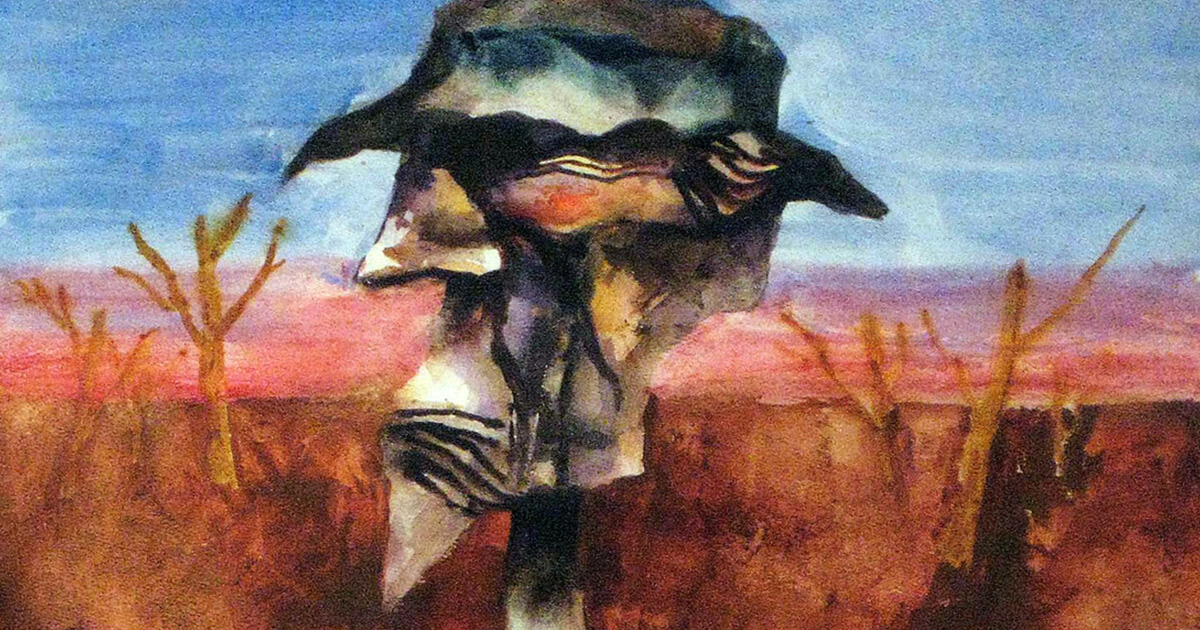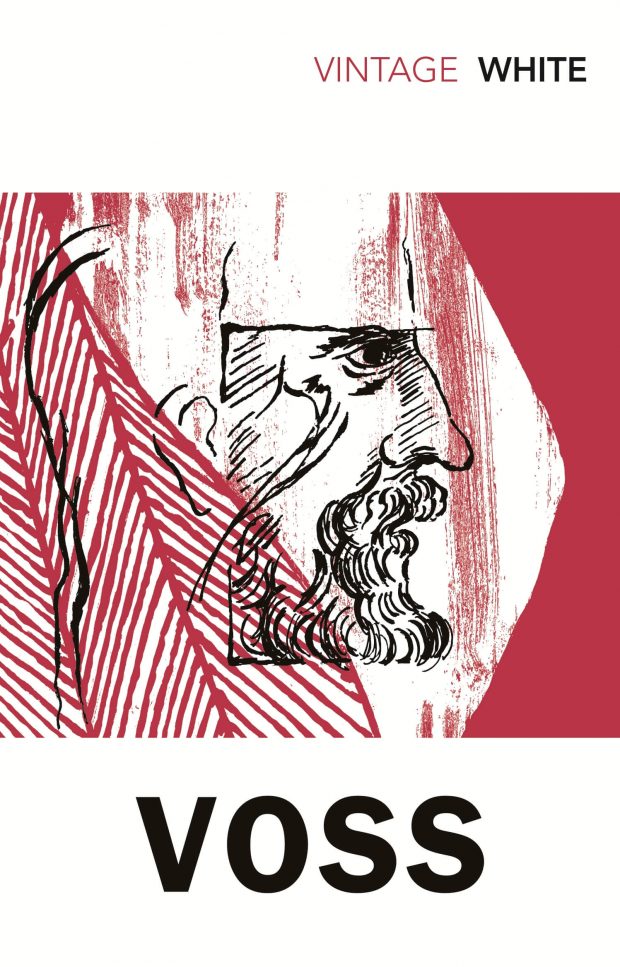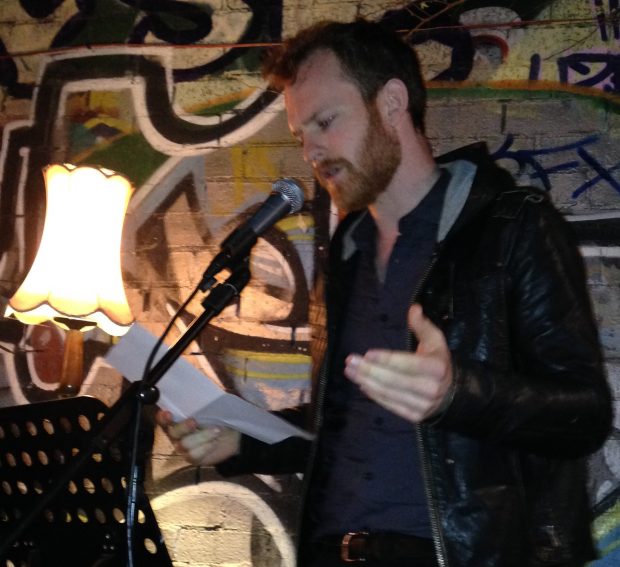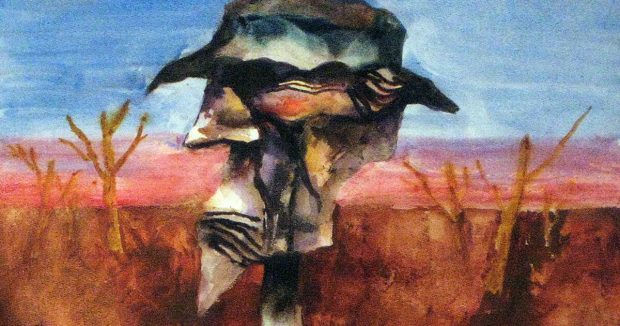
Rethinking Voss || Jonathan Dunk
Increasingly I think that the best kinds of writing about literature estrange it: illuminate its singularities through the performance of reading. So there’s a sense in which a ‘case for’ any particular novel is inherently pyrrhic. That said, where Patrick White’s work is concerned, and Voss more than others, some previous interpretations have today become obstacles concealing the pleasures of the text. I’ll discuss some of these arguments in contexts, before examining an excerpt which exemplifies some of the unusual qualities of White’s writing.
Some brief facts. White was born in 1912, in London, to a grazier family of extensive property. Work was never economically necessary for him, and this privilege was a salient condition of his life. The other such was his experience of homosexuality, which set him at odds with the axioms of his class and culture; an antipathy sharpened by the Second World War, where he heard the bombs falling on metropolitan London, and later fought in the RAF intelligence corps in the Middle-East. One of the two most significant moments of the war was his meeting with Manoly Lascaris, his husband in the meaningful senses of the term, the “mainstay” of his life and work. Despite Vrasidas Karalis’ brilliant work on the subject, Lascaris’ influence on White’s writing, and that of Greek culture generally, remains largely ignored. The other significant moment occurred in the western desert of Egypt, where he conceived of a novel about a megalomaniacal German explorer.
Published in 1957, and set during the 1840s, Voss dramatizes a calamitous expedition into the Australian interior. The eponymous character is based loosely on the historical explorer Ludwig Leichhardt, but draws more from the cultural madness – paraphrasing Auden – that enveloped Germany in the preceding decades. Following an epiphany at the age of thirty-nine, White became deeply, though unconventionally religious, and much of his writing explores metaphysical and spiritual questions. The tone and timbre of his work however, is elaborately performative, ludic, and violently ironic. The relationship between these themes and styles has seen considerable dispute, it was the subject of the 1973 Quadrant debates between Leonie Kramer and Dorothy Green, and later singled out for criticism in Simon During’s revisionist study Patrick White (1996). In Voss the question obtains a wider postcolonial significance: if White’s fiction substantively endorses the kinds of cultural and intellectual experience it depicts, then the novel allegorises the invasion and settlement of the Australian continent in problematic and probably hateful ways.
The allegorical, or transcendent interpretation of White’s work had a complex genesis. It was championed in different ways by New Critics and Cultural Nationalists who had long awaited the Great Australian Author, “the poet of our desolation” prophesied by Marcus Clarke in 1879. This mythical creature would articulate the nation in a new literature, the authentically Australian brilliance of which would resolve the tyrannical anxiety of distance from the Anglophone powers on one hand, and absolve the stains of colonial bloodshed and convictism on the other. Naturally it didn’t work out, but White looked the part, and perhaps played it. He was Oxbridge educated and cosmopolitan, his work was celebrated abroad, he was English, he was male and middle-aged. He wrote the kind of complex and lyrical high-Modernist prose made famous by Joyce and Lawrence; the kind of writing that lent itself to athletic formal interpretation; an ideal theatre for the new kind of trained, academic critics of the mid-century to demonstrate their superiority to the leisured gentlemen of letters who preceded them. Critics whose emphasis of disinterested or abstract qualities like metaphysical transcendence functioned as a sublimated form of Cold War reactionism; we do well to remember that Quadrant was founded with CIA money.
The illusory, transcendent, Australian White can be epitomised by a photograph in in David Marr’s 1991 biography of the author. Taken in 1957, it shows The author is receiving the first Miles Franklin Literary Award for Voss, flanked by Leader of the Opposition H.V. Evatt, and Prime Minister Robert Menzies. Immaculate in congruent three-piece suits, and brill-cream, the three look like members of an Old Boys Club. Menzies readards the book with the polite curiosity of a mining executive contemplating a flower. White’s expression looks nailed on.
In the 70s following Whitlam’s dismissal, and his receipt of the Nobel Prize White became an increasingly public political figure, championing causes from environmentalism and disarmament to republicanism, and of course, Aboriginal Land Rights. The complexity of the profile he now assumed is eloquently expressed by the difference between the prior photograph, and with one taken during an interview he gave to mark the Bicentenary in 1988, which he privately described as an occasion “to celebrate our emptiness in a great shower of bullshit.” Publically, he raised an Aboriginal Flag in his garden, and told Good Morning Australia that his work would be absent from print and stage for a year in protest of the ongoing dispossession and oppression of Aboriginal people. Nonetheless, by the time of his death White had become the icon of a very different Australia; his readership has continued to decline, punctuated by intermittent revivals, adaptions or posthumous releases, and every so often a bout of elegiac sabre-rattling about the detrimental influence of theory or identity politics.
To summarize violently: the transcendent, essentialist reading of White does him a great disservice. There is no meaningful opposition between the spiritual and the performative in White’s work; his characters perform their meaning, move in their own structures of feeling, and their profound and profane experiences are mediated by those structures, and moreover, they are contiguous. In the face of this situational performance of the real, teleological questions are entirely beside the point. Despite – or perhaps because of – the heights of inspired ethical, erotic, or artistic meaning experienced by his characters, they consistently fail to transform epiphany into philosophy, they offer us no truths whatsoever, only objects and images of feeling.
Writing about the influence of Camp on White Peter Kirkpatrick convincingly argues the unsettling and ironizing disjunctions that open between his subjects and his style are “partly, if not wholly, the point,” extending Susan Sontag’s philosophy of Camp as an understanding of “Being-as-Playing-a-Role.” In other words, everything in the White text is a sign, and there is nothing beyond, or above the text. In terms of national questions, White’s work performs the historian Richard White’s argument that in terms of settler-identity there is no ‘real’ Australia waiting to be discovered beyond the hills.
In his 1968 Boyer Lectures Bill Stanner argued that Australian historical consciousness constitutes a national cult of illusion “a structural matter, a view from a window which has been carefully placed to exclude a whole quadrant of the landscape.” In the terms of Australian literature, the structure of that window is realism or literalism, and the critic seeking a ‘transcendent’ White or an ‘authentic’ Australia becomes the timid selector craning their necks to see only so much, so far and no farther. To properly understand one of our ablest authors we must liberate ourselves from the comforting illusions of genre. This means reawakening ourselves to the object of the stage, which is not the clumsy frescoes and landscapes of its (Australian) scenery, but the complex desires and obsessions of its audience. As Barthes wrote in ‘The Death of the Author’ “a text’s unity lies not in its origin but its destination.”
In the present context the consequences of these critical questions can only be demonstrated gesturally, through some richly imply implicative passages. White’s subject-matter in Voss is integral to the novel’s critical power. As White intuited between reading Eyre’s journals in his London bedsit as the light-fixtures trembled under the blitz, and censoring soldiers’ love-letters in the sands of the Gilf Kebir, the explorer is a primary author of national and imperial space. As Robert Dixon writes, the inland explorer became “the historian of his nation’s past, and the prophet of its continental destiny.” In the highly stylised conventions of explorer narratives, the point of departure is of high moment, a heroic pageant working to ritualize history into an epic poem or myth which functions to legitimate the imagined communities of the nation. White’s grasp of the ironies of free indirect discourse is virtuosic; Voss, hitherto regarded as an awkward and ridiculous foreigner is translated by ceremony into an agent of history, an icon of empire:
“already more statue than man…they preferred to cast him in bronze rather than investigate his soul, because all dark things made them uneasy, and even on a morning of historic adventure, in bright, primary colours, the shadow was sewn to the ends of his trousers, where the heels of his boots had frayed them.”
The movement of the narrative gaze here is archetypically Whitean. The illusory depth of the object-idea of the explorer unravels as the linguistic lens recedes, almost nervously, as though to avoid touching, and so dispelling it. The fragile grandeur of occasion steadies itself in the hollow cadence of official language “historic adventure”, and the comforting ekphrastic invocation of a remembered scene “bright, primary colours”. A brittle idea sustains itself in distance, marred by the intimate human fragility of its subject’s frayed hems.
The ceremony itself, including a mechanical oration from the deputy Governor, a “man of self-opinion, of rigidity, and least possible flesh” is relayed in the driest of indirect speech. The invocation of the crown, which self-consciously reinscribes, or performs, the colonizing act, is followed home, brought into question under its own terms, through a descriptive method resembling immanent critique:

“Important heads were bared, stiff necks were bent into attitudes that suggested humble attention. It was a brave sight, and suddenly also moving. British flesh and blood, and the souls tied to them, temporarily, like tentative balloons, by the precious grace of life, might, of that sudden, have been cardboard or little wooden things, as their importance in the scene receded, and there predominated the great tongue of blue water, the brooding, indigenous trees, and sky clutching all… Then a horse neighed, dropped its fragrant dung, and life was resumed.”
White’s fiction often operates according to what Anthony Uhlman calls a “logic of overstatement”, which some interpreters have – not without reason – sometimes merely attributed to the author’s spleen. However, the epistemic logic of colonial modernity is itself a phenomenon of extraordinary excess, of inherently absurd proportions. As Montaigne wrote in his seminal essay on the subject Of Cannibals, “embracing everything we grasped only wind.” White situates settlement’s assertion of possession, of imperial and continental destiny a gesture of surreal absurdity exposing, through parody, the flimsy structures it attempts to conceal. Kirkpatrick reads this approach as a form of deconstruction, a method of “postcolonial distancing” working to relativize and unsettle the oppressive structures of cultural domination.
I’d argue that this tone of critical or performative irony runs throughout Voss’ engagement with the colonial structures of its genre, but others have located forms of sincerity, and so of complicity, in the novel’s later, more ecstatic sections. One such, among the text’s better known scenes, details the explorer’s reckless descent from a ridgeback near the text’s locus amoenus, the beautiful pastoral station of Rhine Towers:
“Presently the path, which had reached a razorback, bristling with burnt stumps, wound suddenly, violently, through a crop of shiny, black rocks, and plunged down. The saddle shot forward over the horse’s withers. The sober gelding propped on his four legs, before himself starting down. All was, indeed, headed downward. The world was slanted that way, a herd of goats clinging to it. The hoofs of these animals clicked, their horns slashed, their pellets spattered, as they slit the scrub open, or nibbled at the blades of grey grass. Yellow eyes looked only once at the rider. Then the goats were dashing down, down, down, deeper than all else. Soon their bobbing tails were lost. The horse had faith that paths do lead somewhere, and did follow, but the country itself was legendary. Birds plunged songless through the leaves in heavy flight. Dark birds, mostly. It was strange that such soft things could explode the silence, but they did, most vehemently, by their mere passage through it.
Voss was jubilant as brass. Cymbals clapped drunkenly. Now he had forgotten words, but sang his jubilation in a cracked bass, that would not have disgraced temples, because dedicated to God.
Yes. GOTT. He had remembered. He had sung it. It rang out shatteringly, like a trumpet blast.
Even the depths lead upward to that throne, meandered his inspired thoughts. He straightened his shoulders, lying back along the croup of the crazily descending horse. It had become quite clear from the man’s face that he had accepted his own divinity…Almost at once, Voss realized that he was righting himself in the saddle because it was no longer necessary to lean back. They had come to the bottom, and there was a woman looking at him.”
This is probably the closest Voss comes to his megalomaniacal object, like Kirilov in Dostoevsky’s Demons, he believes that through an act of will consolidated in bodily martyrdom, he will transcend reality itself, and like the Russian character, he is a profoundly tragicomic character, a holy or infernal fool at the whim of ideology. In this passage he most nearly identifies with the godhead through the Romantic trope of the sublime, a figuration often employed as a ‘vision splendid’ of imperial destiny in colonial discourse, commonly exemplified by Caspar David Friedrich’s lofty painting Wanderer above the Sea of Fog (1818). White’s handling of trope is supremely parodic however, a damning satire of the Romantic subject. For one you’ll note that the apotheotic epiphany occurs not at the summit of a laborious ascent, but in an act of feckless descent. One that echoes, moreover, an iconic moment in Patterson’s nationalist bush-ballad The Man from Snowy River. As in the earlier passage, the figuration of animal life functions as an ironic footnote to the pretensions of false consciousness. Voss escapes breaking his deluded neck because his poor, stolid horse follows a goat-trail. The abrupt, painfully awkward act of exposure at the end, of being over-heard and over-seen, encapsulates White’s view of the fundamentally ridiculous position of the ego.
Amusingly enough Voss concludes with another fatuous ceremony, a parody of literary and consecration, in which a statue of Voss is unveiled in the Domain, and “hung with garlands of rarest newspaper prose.” White’s writing abounds with colliding narratives and subjectivities, it is profusely polyphonic, and sharply dialectical. Its performance of meaning challenges, ironizes, and critiques the ways in which it has always been used to justify oppression and legitimate the vacuities of privilege. Contrary to the narratives of decline, I think White has nothing to fear from theory, that in many ways we are only now beginning to read him well, and that to encounter the wry human texture of his work we need only tear down the monument of it.
* * *

Jonathan Dunk is the Kenneth Reed Postgraduate Scholar at the University of Sydney, where he teaches literature and critical theory. His scholarship, fiction and poetry have been published in a wide range of national and international journals including Textual Practise, Tripwire, Meanjin, JASAL, Overland, the ABR, Cordite, Australian Poetry, and the Australian Book Review. He has been shortlisted for the Overland Victoria University prize, and awarded the A.D. Hope prize. He lives on Wangal country.
